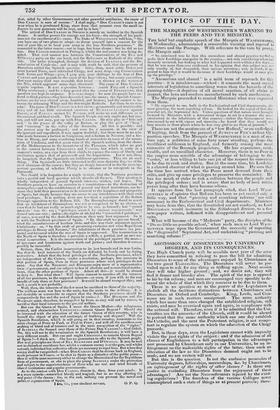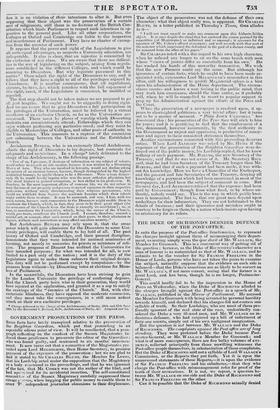ADMISSION OF DISSENTERS TO UNIVERSITY DEGREES, AND ITS CONSEQUENCES.
THE High Church party will be sensible next year of the error they have committed in refusing to pass the bill for admitting Dissenters to some of the advantages enjoyed by Churchmen at the two great Universities. The Dissenters will never be prevailed upon to ask for any thin". so trifling again. _ Next session they will take higher ground; and, we doubt not, they will find it firmer and broader also. The spirit of the age is opposed to bit-by-bit reform; and men are encouraged very speedily to demand the whole of that which they conceive to be due to them.
There is no question as to the power of the Legislature to abolish all the factitious distinctions between Churchmen and Dissenters at Oxford and Cambridge. King, Lords, and Commons are in such matters omnipotent. The same authority which has more than once changed the established religion, still exists, and may be exercised again and again, in compliance with the national will. Therefore, even if it be admitted that the Universities are the nurseries of the Church, still it would be absurd to pretend that the same authority which can one day establish the Catholic, and the next the Protestant religion, is not competent to regulate the system on which the education of the Clergy proceeds.
But, in these days, even the Legislature cannot with impunity violate the just rights of the subject : and if the admission of all classes of Englishmen to a full participation in the advantages now possessed by Churchmen only in our Universities, be an infringement on the undeniable rights of the latter, then such an alteration of the law as the Dissenters demand ought not to be made, and we are certain will not.
But this is the question. Is not the exclusive possession of University degrees, fellowships, masterships, &c. by Churchmen, an infringement of the rights of other classes? Is there any justice in excluding Dissenters from the enjoyment of these advantages? Are not the Nonconformists injured by the existing regulations ? The founders of the various Colleges never contemplated such a state of things as at present prevails; thew fore it is no violation of their intentions to alter it. But even supposing that their object was the preservation of a certain sect of religionists, still there is no doctrine of the British Constitution which binds Parliament to respect such intentions in op
position to the general good. Like all other corporations, the Colleges at Oxford and Cambridge are liable to the inspection and interference of Parliament. They have no charter of exemption from the exercise of such power.
It appears that the power and right of the Legislature to give all sects equal advantages, as respects a University education, are indisputable. It also is clear, that an injustice is committed by the exclusion of ally class. We are aware that there are difficulties in the way of legislating on the subject, arising from regulations established in the different Colleges, and which would be annoying to Dissenters. But why legislate piecemeal in this matter' Once admit the right of the Dissenters to any, and it follows that they have a right to all of the privileges enjoyed by Churchmen. It is another consequence, that all regulations, statutes, by-laws, &o. which interfere with the full enjoyment of this right, must, if the Legislature is consistent, be modified or repealed. The first step should not be taken unless we are prepared to go all just lengths. We ought not to be niggardly in doing right. And we are aware that to give Dissenters a full participation in the privileges of the Universities, must be followed by a virtual overthrow of an exclusive Chursh, as far as the Universities are concerned. There must be places of worship which Dissenting students can conscientiously attend; Fellowships which they can enjoy without professing any particular creed; and they must be eligible to Masterships of Colleges, and other posts of authority in the Universities. This amounts to a rupture of the connexion now subsisting between the Universities and the Established Church.
Archdeacon BUTLER, who is an extremely liberal Archdeacon, admits the right of Dissenters to lay degrees, but contends for safeguards and restrictions. In a charge* lately delivered to the clergy of his Archdeaconry, is the following passage.
" Few of us, I presume, if desirous of information on any subject of science, would refuse to consult an able treatise, because it was written by a Dissenting Master of Arts. They who are involved in lawsuits, would not decline asking the opinion of an eminent lawyer, because, though distinguished by the highest academical honours, he might chance to be a Dissenter. Were a man danger • ously ill, he would hardly inquire who was the most orthodox physician, but who stood highest in general estimation, as best skilled in his profession. If, therefore, in the most important affairs of common life, we do not refuse to trust the care of our property and persons to men of eminence in their respective professions, without nicely discriminating their religious persuasions, why should we withhold from laymen the academic honours which their talents might entitle them to claim. It may be answered, and now, I fear, with too much reason, because such concessions to the Dissenters might enable them to overthrow the Church, which, in fact, they avow to be their great object (for the severance of the Church from the State is virtually its overthrow); or, at least, to overthrow the Universities, which, being the nurses of the Church, would, TO tanto, overthrow the Church itself. I cannot, therefore, commit a suicidal act, or consent, after such avowal on their parts, to their admission to degrees, without such restrictions as may afford ourselves security."
But Archdeacon BUTLER may rely upon it, that the same power which will gain admission for the Dissenters to some University privileges, will enable them to lay hold of all. The past history of Oxford and Cambridge, and their present discipline, demonstrate that they were intended for national seminaries of learning, not merely as nurseries for priests or ministers of religion. The progress of Dissent has unfitted the Universities for their intended purposes ; for what was intended for all, is now limited to a part only of the nation ; and it is the duty of the Legislature again to make them subserve their original design. This duty will not be performed except by compulsion—by the pressure from without—by Dissenting votes at elections for Members of Parliament.
In the meanwhile, the Dissenters have been striving to gain for the London University the privilege of conferring degrees. Had the Church party been wise in their generation, they would have rejoiced at the application, and granted it as a sop to satisfy the cravings of the "enemies of the Church." But, with characteristic blindness, they have opposed the moderate concession, and they must take the consequences, in a still more ardent attack on their own exclusive privileges.
• Charge delivered to the Merge of the Archdcaconry of Derby. 26th and 27th .lone
1831, by the Reverend 8. Bunk:a:D.1d., Archdeacon of Derby. Longman and Cu.





















 Previous page
Previous page